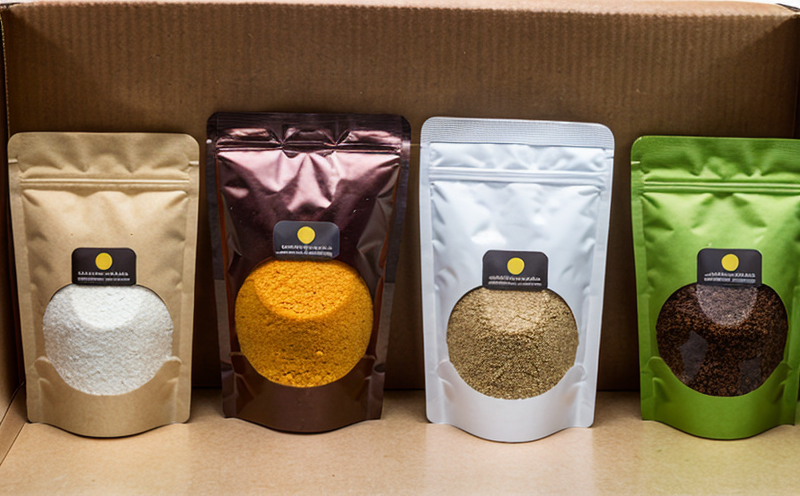Migration Testing of Monomers in Plastics
The migration testing of monomers in plastics is a critical aspect of ensuring food safety and consumer protection. This test evaluates whether harmful substances, including monomers, migrate from packaging or other plastic materials into contact with foodstuffs during processing, storage, or consumption. Understanding this process is essential because it can lead to contamination that may pose health risks.
Monomers are the building blocks of polymers and can be present in certain types of plastics used for food packaging. These monomers can migrate into food products under specific conditions such as temperature changes, exposure to solvents or acids, and prolonged contact with foodstuffs. Regulatory bodies like the European Union (EU) and the United States Food and Drug Administration (FDA) have stringent requirements regarding these migrations.
For instance, the EU's Regulation (EC) No 10/2011 on plastics intended to come into contact with food defines specific monomers that are not allowed to migrate into foodstuffs. Similarly, the FDA's Code of Federal Regulations Title 21 provides detailed guidelines for materials used in packaging.
The testing process involves several steps. Initially, the plastic sample is prepared according to standard methods such as ISO 6497 or ASTM D3985. The specimen must be representative and free from any contamination that could affect test results. Once ready, the sample undergoes immersion in a food simulant under controlled conditions.
The food simulants used can vary based on the type of food expected to come into contact with the plastic. For instance, water for beverages or tomato juice for acidic foods are common choices. After the specified time period (often 24 hours), the sample is removed from the simulant and analyzed using sophisticated analytical techniques like gas chromatography-mass spectrometry (GC-MS) or liquid chromatography-tandem mass spectrometry (LC-MS/MS).
The results of these analyses provide quantitative data on the level of monomer migration, which can then be compared against set limits. Compliance with these limits is crucial to ensure that food products remain safe for consumption.
Understanding the migration behavior of monomers in plastics helps manufacturers make informed decisions about material selection and processing conditions. By adhering to rigorous testing protocols, companies can mitigate potential health risks associated with exposure to harmful substances during food consumption.
Why It Matters
Migration testing is not just a compliance requirement; it's also a fundamental step in ensuring the safety and quality of products that come into contact with food. Regulatory bodies worldwide recognize the potential dangers posed by monomers migrating from packaging materials into foodstuffs.
The EU, for example, has established strict guidelines to prevent such migrations through its Plastics Regulation (EC) No 10/2011. This regulation mandates that all plastics intended to come into contact with food must undergo rigorous testing before being approved for use. Similarly, the FDA in the United States maintains a list of substances known or reasonably expected to be harmful if they migrate from packaging materials into food.
The consequences of non-compliance can be severe. In 2018, a major manufacturer faced significant fines and recalls due to unacceptable levels of monomer migration in their plastic containers for infant formula. This incident highlighted the importance of thorough testing and compliance with regulatory standards.
In addition to safety concerns, there are also reputational risks associated with non-compliance. Consumers increasingly demand transparency about the materials used in food packaging. A failure to meet these expectations can lead to loss of consumer trust and potential legal action against the company involved.
By investing in migration testing, companies demonstrate their commitment to product safety and regulatory compliance. This not only protects consumers but also enhances brand reputation and customer confidence.
Eurolab Advantages
Eurolab offers comprehensive services tailored specifically for the needs of industries involved with food contact materials and packaging. Our expertise lies in providing precise, accurate, and reliable testing that meets international standards.
We employ state-of-the-art equipment and methodologies to ensure consistent results across all tests conducted at our facilities. Our team comprises highly qualified professionals who stay updated on the latest developments in regulatory requirements and testing techniques.
Our commitment to quality extends beyond just technical proficiency; we also prioritize customer satisfaction by offering personalized service and prompt communication throughout every stage of your project. Whether you need assistance with sample preparation, analysis, or interpretation of results, our dedicated staff is here to support you.
In addition to our core testing capabilities, Eurolab provides valuable insights through detailed reports that outline test procedures, findings, and recommendations for improvement if necessary. These reports serve as valuable tools for decision-makers within your organization, helping them stay ahead of changing regulatory landscapes and market trends.
Why Choose This Test
Selecting the right testing method is crucial when it comes to ensuring that food contact materials are safe for use. One such essential test is migration testing focused on monomers in plastics. Here’s why this particular type of testing stands out:
Compliance with Regulations: Meeting regulatory requirements is paramount in today's competitive market environment. By conducting thorough migration tests, manufacturers can ensure their products comply with international standards like those set by the EU or FDA.
Risk Management: Identifying and managing risks associated with potential migrations early on allows businesses to take proactive measures against any adverse effects they might have on human health.
Consumer Trust: Demonstrating a commitment to safety builds trust among consumers who value transparency regarding the materials used in their food packaging. This can translate into increased sales and loyalty towards your brand.
Innovation Opportunities





